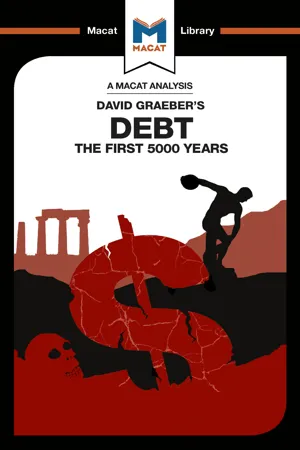
- 88 pages
- English
- ePUB (mobile friendly)
- Available on iOS & Android
About this book
Debt is one of the great subjects of our day, and understanding the way that it not only fuels economic growth, but can also be used as a means of generating profit and exerting control, is central to grasping the way in which our society really works.
David Graeber's contribution to this debate is to apply his anthropologists' training to the understanding of a phenomenon often considered purely from an economic point of view. In this respect, the book can be considered a fine example of the critical thinking skill of problem-solving. Graeber's main aim is to undermine the dominant narrative, which sees debt as the natural – and broadly healthy – outcome of the development of a modern economic system. He marshals evidence that supports alternative possibilities, and suggests that the phenomenon of debt emerged not as a result of the introduction of money, but at precisely the same time.
This in turn allows Graeber to argue against the prevailing notion that economy and state are fundamentally separate entities. Rather, he says, "the two were born together and have always been intertwined" – with debt being a means of enforcing elite and state power. For Graeber, this evaluation of the evidence points to a strong potential solution: there should be more readiness to write off debt, and more public involvement in the debate over debt and its moral implications.
Frequently asked questions
- Essential is ideal for learners and professionals who enjoy exploring a wide range of subjects. Access the Essential Library with 800,000+ trusted titles and best-sellers across business, personal growth, and the humanities. Includes unlimited reading time and Standard Read Aloud voice.
- Complete: Perfect for advanced learners and researchers needing full, unrestricted access. Unlock 1.4M+ books across hundreds of subjects, including academic and specialized titles. The Complete Plan also includes advanced features like Premium Read Aloud and Research Assistant.
Please note we cannot support devices running on iOS 13 and Android 7 or earlier. Learn more about using the app.
Information
Table of contents
- Cover Page
- Title Page
- Copyright
- Contents
- WAYS IN TO THE TEXT
- SECTION 1: INFLUENCES
- SECTION 2: IDEAS
- SECTION 3: IMPACT
- Glossary of Terms
- People Mentioned in the Text
- Works Cited